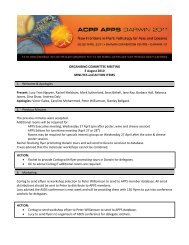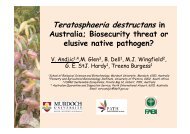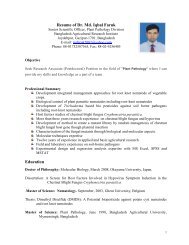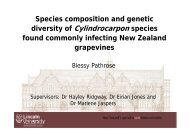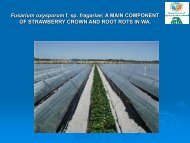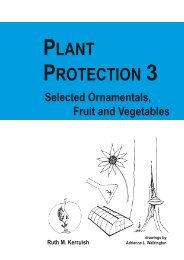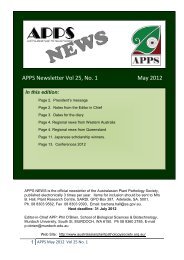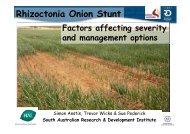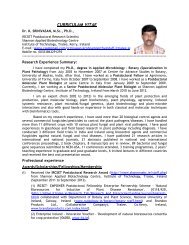View PDF - Australasian Plant Pathology Society
View PDF - Australasian Plant Pathology Society
View PDF - Australasian Plant Pathology Society
Create successful ePaper yourself
Turn your PDF publications into a flip-book with our unique Google optimized e-Paper software.
The McAlpine lecture<br />
The invitation to present the McAlpine lecture to the biennial<br />
conference of the <strong>Australasian</strong> <strong>Plant</strong> <strong>Pathology</strong> <strong>Society</strong> is<br />
extended to an eminent scientist in recognition of their<br />
significant contribution to <strong>Australasian</strong> plant pathology. The<br />
lecture is named after Daniel McAlpine, considered to be the<br />
father of plant pathology in the <strong>Australasian</strong> region. His most<br />
notable contributions were to study wheat rust following the<br />
1889 epidemic, to classify and describe Australian smuts, and to<br />
recognise Ophiobolus graminis (now Gaeumannomyces<br />
graminis) as the cause of wheat take‐all. He also collaborated<br />
with Farrer on resistance to rust in wheat (John Randles 1994,<br />
Stanislaus Fish 1976). Daniel McAlpine also contributed<br />
extensively to vegetable pathology. It is therefore fitting that a<br />
plant pathologist with extensive experience and passion such as<br />
Phil Keane be asked to deliver the McAlpine lecture in 2009.<br />
1976 Dr Lilian Fraser, Department of Agriculture, NSW<br />
Disease of citrus trees in Australia—the first hundred years<br />
1978 Dr David Griffin, Australian National University, ACT<br />
Looking ahead<br />
1980 Mr John Walker, Department of Agriculture, NSW<br />
Taxonomy, specimens and plant disease<br />
1982 Professor Richard Matthews, The University of Auckland, NZ<br />
Relationships between plant pathology and molecular biology<br />
1984 Professor Bob McIntosh, University of Sydney, NSW, and<br />
Dr Colin Wellings, Department of Agriculture, NSW<br />
Wheat rust resistance: the continuing challenge<br />
1986 Dr Allen Kerr, Waite Agricultural Research Institute, SA<br />
Agrobacterium: pathogen, genetic engineer and biological<br />
control agent<br />
1989 Dr Albert Rovira, CSIRO Division of Soils, SA<br />
Ecology, epidemiology and control of take‐all, rhizotomies bare<br />
patch and cereal cyst nematode in wheat<br />
1991 Mr John Walker, Department of Agriculture, NSW<br />
<strong>Plant</strong>s, diseases and pathologists in Australasia—a personal<br />
view<br />
1993 Dr John Randles (University of Adelaide, SA<br />
<strong>Plant</strong> viruses, viroids and virologists of Australasia<br />
1995 Dr Ron Close, Lincoln University, NZ<br />
The ever changing challenges of plant pathology<br />
1997 Professor John Irwin, CRC Tropical <strong>Plant</strong> <strong>Pathology</strong>, Qld<br />
Biology and management of Phytophthora spp. attacking field<br />
crops in Australia<br />
1999 Dr Dorothy Shaw, Department of Primary Industries, Qld<br />
Bees and fungi with special reference to certain plant pathogens<br />
2001 Dr Alan Dube, South Australian Research and Development<br />
Institute, SA<br />
Long‐term careers in plant pathology<br />
2003 Dr Mike Wingfield, University of Pretoria, South Africa<br />
Increasing threat of disease to exotic plantation forests in the<br />
southern hemisphere<br />
2007 Dr Graham Stirling, Biological Crop Protection, Qld<br />
The impact of farming systems on soil biology and soil‐borne<br />
diseases: examples from the Australian sugar and vegetable<br />
industries, the case for better integration of sugarcane and<br />
vegetable production and implications for future research<br />
2009 Assoc Prof Phil Keane, La Trobe University, Vic<br />
Lessons from the tropics—the unfolding mystery of vascularstreak<br />
dieback of cocoa, the importance of genetic diversity,<br />
horizontal resistance, and the plight of farmers<br />
McAlpine lecturer 2009: Philip Keane<br />
Philip grew up in the wheat/sheep belt<br />
of rural South Australia and gained his<br />
Bachelor of Agricultural Science (Hons)<br />
at the Waite Agricultural Research<br />
Institute, University of Adelaide in<br />
1968.<br />
He was awarded a PhD at the<br />
University of Papua New Guinea in<br />
1972 for his studies of vascular‐streak<br />
dieback, a serious epidemic disease of<br />
cocoa. He described and named the<br />
pathogen, Oncobasidium theobromae,<br />
and remains the world authority on what is a particularly<br />
unusual vascular wilt disease. Not only was the pathogen a new<br />
species, but also a new genus within the Basidiomycetes.<br />
Philip taught at UPNG before taking up a lectureship at La Trobe<br />
University in 1975. His time at La Trobe has been supplemented<br />
with sabbatical periods in the USA and Central America, as well<br />
as extensive project‐related travel through PNG and Indonesia.<br />
Since returning to Australia in 1975 Philip maintained his interest<br />
in diseases of cocoa in South East Asia and Papua New Guinea,<br />
and in agricultural development and education in tropical<br />
countries. His approach is focussed on the farmer—from<br />
listening to farmers, evaluating their ideas, then translating his<br />
research to be used by the farmers. Philip also initiated research<br />
into fungal diseases of crop plants and eucalypts, and co‐edited<br />
the standard monograph on Eucalypt Pathogens and Diseases.<br />
He is involved in research on a range of big questions in plant<br />
pathology, including the nature of resistance to crop diseases,<br />
especially cereal rusts, plant disease epidemiology, the diversity<br />
of macrofungi and broad questions in plant ecology.<br />
Philip is an enthusiastic undergraduate teacher and has trained<br />
many local and international PhD students, many of whom will<br />
be attending this conference. He has made a special and unique<br />
contribution to plant pathology in Australia and neighbouring<br />
countries, and it is a great honour that he has accepted our<br />
invitation to present the McAlpine Lecture.<br />
2005 Dr Gretna Weste, University of Melbourne, Vic<br />
A long and varied fungal foray<br />
8 PLANT HEALTH MANAGEMENT: AN INTEGRATED APPROACH | APPS 2009


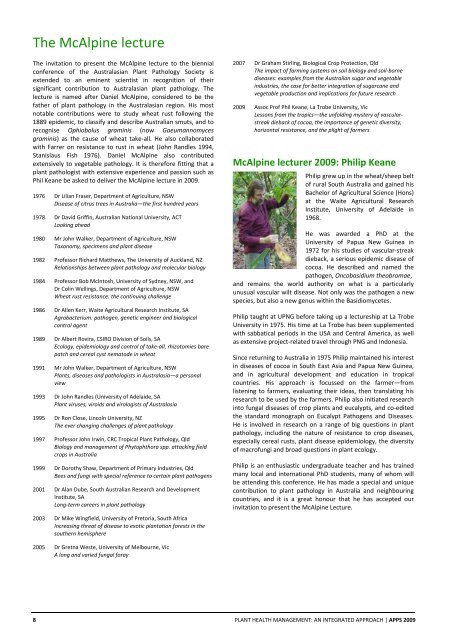
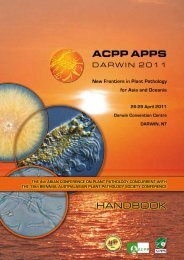
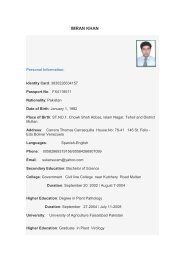

![[Compatibility Mode].pdf](https://img.yumpu.com/27318716/1/190x135/compatibility-modepdf.jpg?quality=85)
